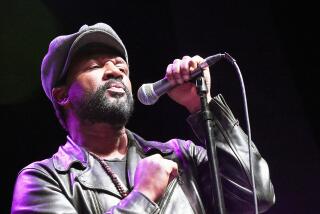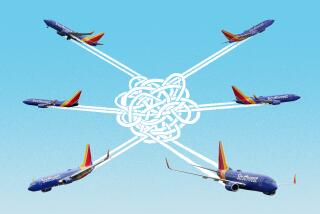Intrigue Trails Airline Linked to Iran, Contras
- Share via
MIAMI — When U.S officials wanted to ship arms to Iran, they called 305-871-5171: Southern Air Transport, the “worldwide charter specialists” with “oversized cargo capabilities” and “remote site delivery.”
And when the contras in Nicaragua needed supplies ferried from Portugal to air bases in Central America, they dialed the same number.
And when Americans running guns to the contras needed mechanics to fix their dilapidated planes, they too used Southern Air.
And now, when the House and Senate intelligence committees and a federal grand jury are handing out subpoenas, they also have remembered to call on the Miami-based airline, once owned by the CIA and now caught up in virtually every thread of scandal that has tightened around the Reagan Administration.
‘We Fly Anywhere’
“We fly cargo anywhere in the world, and we are ready to go at a moment’s notice. . . ,” said company spokesman William Kress. “We pride ourselves on confidentiality. Our customers can rely on it.”
But it is now time to talk. Investigators want to know what some of that cargo was, as well as where and when it landed and who paid the tab.
Last week, Southern Air’s president, William G. Langton, denied that the airline has broken any laws and promised complete cooperation in all investigations.
Candor will be essential, for the airline’s part in the scandal is a tangle. Not only is the company being investigated, but even the investigations into the company are being investigated.
The Justice Department has admitted that it held back a probe of Southern Air for 10 days in late October and early November at the request of Vice Adm. John M. Poindexter, then the President’s national security adviser.
Poindexter feared, a Justice Department spokesman said, that the investigation would interfere with arms shipments to Iran and the possible release of American hostages in Lebanon. The department’s internal inspector is looking into the delay.
But that subplot is only a bit of the intrigue that has enveloped the airline, which flies a fleet of 25 big-bellied cargo planes and does more than half of its business with the U.S. government.
“This whole thing is frustrating as hell,” Kress said of the recent attention. “I get tired of denying all the allegations that we’re subsidized by the CIA. It’s totally untrue.
“I don’t think we have any working relationship with the CIA. Well, I know we don’t. With the (National Security Council), maybe. And if the NSC, well, maybe the CIA. But not a working relationship.”
Southern Air was born in Miami in 1949, a small charter operation that hauled cargo to the Bahamas. Eleven years later, it still had only three planes and plenty of debts.
In 1960, it found an eager buyer. The CIA was looking to obtain airlines that could do covert work under legitimate cover. It purchased Southern Air for $300,000 and extended the airline’s operations into the Far East and Latin America.
Far-Flung Empire
In the next decade, Southern Air joined with Air America, Air Asia, Civil Air Transport and dozens of tiny puddle-jumping lines to form a far-flung empire of airlines, together known as the CIA “proprietaries.”
Most of their work was the routine, above-board hauling of freight and passengers. Yet when necessary, the planes could be used to drop an agent into Red China or supply a secret army in the mountains of Laos.
“All the airlines used the same air crew seniority list,” said William M. Leary, a University of Georgia history professor and author of a book about the CIA airlines. “One day a guy worked for Southern Air and the next day Air America.”
The proprietaries were operated under a single holding company, the Pacific Corp. Its chief executive was the late George A. Doole Jr., a brilliant, tight-lipped man who is something of a legend in CIA ranks.
As late as 1970, when there were plenty of suspicions about CIA connections to Pacific Corp., Doole coolly told a reporter: “If someone out there is behind all this, we don’t know about it.”
Fleet Sold
Finally, by 1973, newspaper stories and congressional hearings revealed so much about the proprietaries that there was hardly any cover left to blow. The huge fleet was sold to private companies.
But that did not mean the CIA entirely lost touch. “A pool of individuals stayed with the airlines, so they had a lot of experience for handling sensitive missions,” Leary said.
Southern Air was sold for $2.1 million--only about half its stockholder equity. According to documents filed with federal officials, one of the company’s chief customers then became the government of Iran.
In 1979, the airline was sold once again, this time to James H. Bastian, a top-notch Washington, D.C., aviation attorney who had worked with Doole at the Pacific Corp. from 1961 to 1974, as secretary, vice president and general counsel.
Bastian keeps office hours at Southern Air headquarters, now being moved into a modern building from an old gray hangar on the perimeter of Miami International Airport. He has been unavailable for comment.
Company Thrives
Under Bastian’s ownership, Southern Air has thrived, especially after 1983, when he brought in Langton as president. In just the last year, the number of employees has doubled to about 540, half of them in Miami.
Customers are diverse. The airline has shipped piglets to Caracas, Venezuela, and an entire circus to San Juan, Puerto Rico. It makes deliveries for a parcel service based in Fort Wayne, Ind.
Working for the U.S. State Department, it supplies the U.S. Interests Section in Havana. It also made deliveries to the contras as part of a $27-million humanitarian aid program.
In war-torn Angola, it provides airlift services for that Marxist government’s diamond-mining company. More than that, a former Southern Air pilot said, it has also flown fuel for Angola’s military, though the company has repeatedly denied working either for the Angolan military or the U.S.-backed rebels there.
Southern Air’s revenues have increased from $9.8 million in 1982 to $38.9 million in 1985. Estimated revenues for 1986 are $68 million; in 1987, they are expected to reach $110 million.
New Contracts
The prosperity, Kress said, is largely because of new contracts won with an expanded fleet. In the past 18 months, the airline has more than doubled its number of planes, primarily through lease agreements. It flies eight Boeing 707s and 17 Lockheed L-100s, the civilian version of the Hercules C-130.
Much of the new business comes from competitively bid contracts with the U.S. Military Airlift Command at Scott Air Force Base in Illinois. The airlift command pays civilian airlines to carry passengers and cargo loads that generally do not include munitions.
In fiscal year 1984, Southern Air earned $17 million from the military hauls. For fiscal year 1987, the contracted total is up to $44 million, airlift command spokesman Lt. Jerry Todd said.
Contracted routes have included flights to the Ilopango Air Base in El Salvador. Aboard the planes have been construction materials, medical supplies, office supplies and spare parts, Todd said.
But Ilopango was more than just an occasional stop for Southern Air’s airlift command-contracted flights. It also was a place where it often sent its mechanics.
Contra Staging Area
The military airfield was a staging area for the contras, and the company serviced the planes that carried guns and supplies into the field.
America began to learn something of those secret airdrops Oct. 5, when a Nicaraguan soldier shot down an old C-123 over a stretch of jungle.
One of the three men killed was a former CIA proprietary pilot named William J. Cooper, who was carrying a Southern Air identification card. Among other papers aboard the plane was company president Langton’s business card.
When questioned by reporters, airline officials--in icy replies that would have made Doole proud--denied any knowledge of Cooper or the plane.
But soon those denials seemed lame. Captured crewman Eugene Hasenfus, who had parachuted from the crippled C-123, said he believed he was part of a CIA-backed effort to run guns to the contras.
He named Southern Air as the outfit that maintained the rickety, smoke-spitting planes and fit them with navigational gear. He said the company even paid his expenses to the Ilopango base.
Such CIA-backed supply efforts would have been illegal. At the time, U.S. government agencies were barred from sending arms to the rebels.
The CIA has consistently denied any involvement with the hapless crew or any private aid network, but Southern Air officials reluctantly began changing their story as the revelations continued.
Cooper, they now say, carried a Southern Air ID card so he could have easy access to their securely guarded Miami facilities.
Southern Air had dealt with the former CIA pilot for eight months before the crash, Kress said. “We serviced the planes. Cooper was our contact. For all we knew, this was his operation.”
The company certainly was obliging. When Cooper purchased the doomed C-123 from a Daytona Beach, Fla., airplane trader, it was Southern Air that put up the $300,000 price.
“The aircraft was available, and (the owner) wasn’t going to extend any credit and we were able to do it faster,” Kress said. “So we cut the check and we were reimbursed.
‘Big Picture’ Knowledge
“Mr. Langton (Southern Air’s president) trusted Cooper for his own reasons. You could say he was knowledgeable of the big picture.”
Killed with Cooper in the C-123 was Wallace Blaine Sawyer Jr., a pilot who had worked for Southern Air until April of this year. His flight log listed the names of at least a dozen company employees.
Last month, Atty. Gen. Edwin Meese III announced that the Administration had sold arms to Iran and that profits from the deal had been funneled without the President’s knowledge to the contras.
Again, Southern Air was in the midst of the action. The National Security Council had hired it to help with the Iran delivery.
Southern Air B-707s and crews ferried four loads of the Iran-bound weapons from the United States as far as Israel, Langton said. He insisted, however, that the company’s planes did not fly the final leg from Tel Aviv.
On the return, the B-707s stopped in Lisbon and loaded up again, federal investigators said. The new cargo was believed to be weapons for the contras.
All that, as Southern Air’s ads like to brag, may indeed show the company to be a leader in worldwide charters and remote site delivery. To be sure, it has flown its way into the tempest of a national scandal.
“I guess people outside the air cargo community find this all very interesting,” Kress noted dryly. “It makes a great spy novel.”
More to Read
Sign up for Essential California
The most important California stories and recommendations in your inbox every morning.
You may occasionally receive promotional content from the Los Angeles Times.













